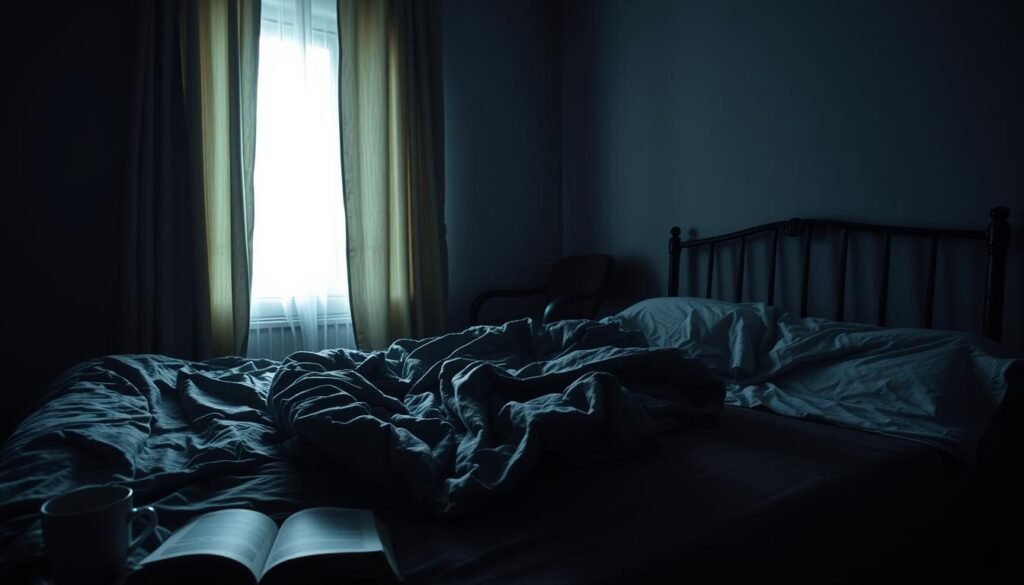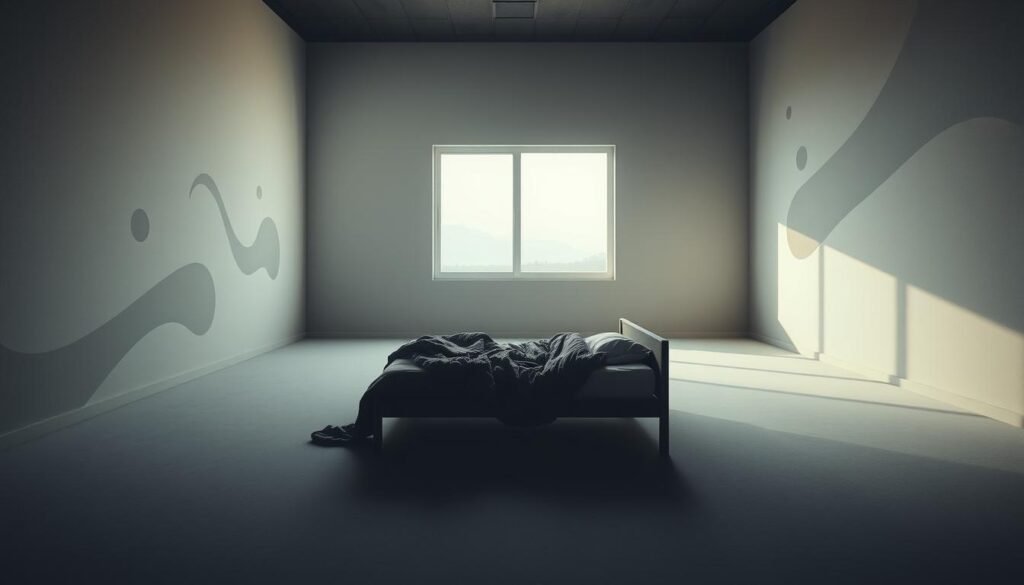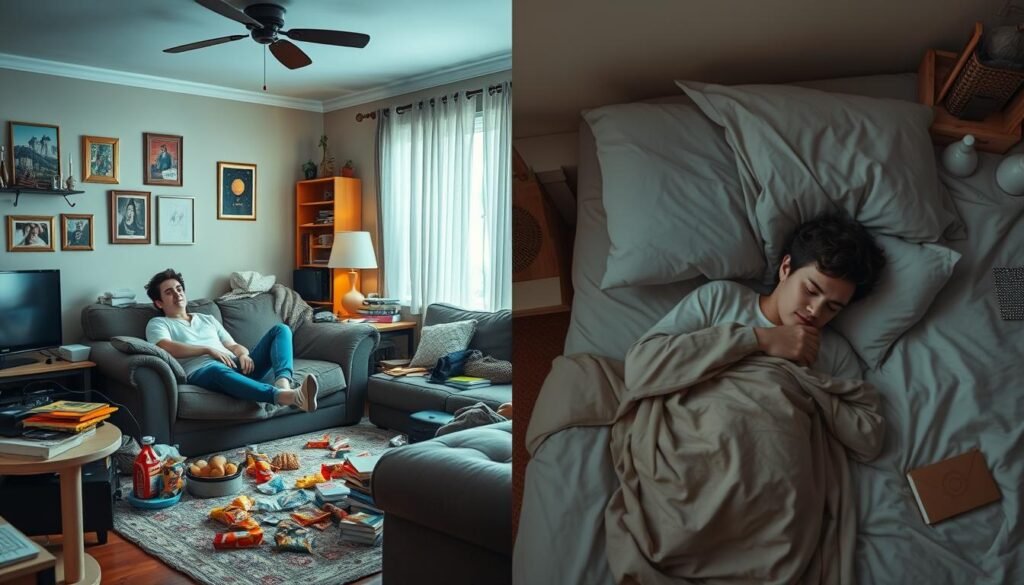It’s a shock, but up to 40% of people face hypersomnia at some time. This extreme need to sleep can make you feel stuck, wanting to sleep all day. It’s key to know why you feel so tired. Often, wanting to sleep a lot isn’t about being lazy.
It could mean there are bigger issues like sleep disorders or mental health concerns. In this piece, we take a closer look at why you might feel so sleepy. We’ll offer insight to help those dealing with this tough challenge.
Key Takeaways
- Excessive sleepiness affects a significant portion of the population, making it a common concern.
- Hypersomnia can result from various factors, including sleep disorders and lifestyle impacts.
- Understanding underlying causes is crucial for finding effective solutions.
- Mental health conditions like depression may contribute to feelings of lethargy.
- Improving sleep hygiene can significantly reduce daytime sleepiness.
Understanding Excessive Sleepiness
Up to 25% of Americans are hit by excessive sleepiness. It’s not just about sleeping a lot. People feel tired all day. Unlike simple tiredness, this condition can mess with your day. It affects work and friendships. People have trouble staying awake, similar to how it feels right after waking up.
Lack of sleep over time leads to this exhaustion during the day. This can cause big health problems like diabetes, obesity, and heart disease. Different age groups face different risks. Children’s growth could slow down, and older people might fall more or have memory problems.
Sleep disorders, including obstructive sleep apnea and restless legs syndrome, cause unsteady sleep. Narcolepsy makes people very sleepy suddenly during the day. Problems with the body’s internal clock make these issues worse, upsetting the normal sleep-wake cycle.
Genes might play a role in daytime sleepiness. Also, conditions like depression and anxiety often go hand-in-hand with feeling overly tired. It’s important to figure out the main cause to treat it properly.
If you want to learn more about excessive sleepiness, check out this helpful guide. It has good info on symptoms, reasons for the condition, and how to treat it.
Common Causes of Wanting to Sleep All the Time
Many people often feel very sleepy. This could be due to various reasons, from daily habits to health issues. Being sleepy during the day is common and can stem from not getting good sleep. This might be due to the environment, bad sleep routines, or napping late.
Several factors can make you feel very tired. Health problems like anemia, COPD, and chronic fatigue can lower your energy. Diseases that affect the immune system, like lupus and rheumatoid arthritis, affect how your body works and your nerves too.
Feeling sad can make you tired, and stress can make sleeping hard. This leads to always feeling tired. Sleep issues, like insomnia, make it hard to sleep well. People with sleep problems may take a long time to fall asleep or wake up often at night.
What you eat also affects how awake you feel. Not getting certain vitamins and minerals, changes in blood sugar, too much alcohol, and a lot of caffeine can make you very sleepy. Not drinking enough water also makes you more tired.
To deal with being overly sleepy, we need to understand why it happens. Here’s a table that points out some common reasons:
| Factor | Description |
|---|---|
| Lifestyle Choices | Poor bedtime routines, sedentary habits, and dietary factors affect energy levels. |
| Medical Conditions | Anemia, autoimmune diseases, and chronic fatigue syndrome can lead to significant fatigue. |
| Sleep Disorders | Conditions such as insomnia impair restful sleep and contribute to excessive daytime sleepiness. |
| Emotional Factors | Depression and stress are common contributors to feelings of lethargy and sleep difficulties. |
| Nutritional Factors | Vitamin deficiencies and dehydration can greatly impact tiredness levels. |
I Just Want to Sleep All the Time and Do Nothing: Possible Underlying Issues
This section looks at why someone might feel very tired and want to sleep a lot. We focus on three main causes: depression, sleep disorders, and health issues. Each can really affect how energetic and happy you feel.
Depression and Apathy
Depression often changes how and when you sleep. You might sleep too much or lose interest in things you once liked. Feeling very tired, having little motivation, and being irritable are common signs of depression.

Sleep Disorders
Some sleep disorders can mess with your sleep’s quality, leaving you tired during the day. Sleep apnea, for example, stops your breathing repeatedly at night. Restless legs syndrome makes it hard to sleep because your legs feel uncomfortable. Both can make you feel exhausted and keen to sleep a lot during the day.
Physical Health Conditions
Many health problems are linked to feeling very tired and having trouble sleeping. Chronic pain conditions, cancer, and thyroid problems can all make you extremely tired. For instance, about 90% of people with type 2 diabetes have sleep issues.
Also, around one million people in the U.S. have chronic fatigue syndrome. About four million have fibromyalgia, which affects sleep and energy too.
| Health Condition | Impact on Sleep | Prevalence in U.S. Population |
|---|---|---|
| Chronic Fatigue Syndrome | Profound fatigue, unrefreshing sleep | ~1 million |
| Fibromyalgia | Widespread pain, sleep disturbance | ~4 million |
| Type 2 Diabetes | Sleep problems reported by 90% | Increasing prevalence |
| Thyroid Disorders | Fatigue, potential depression | ~60% report symptoms of depression |
Understanding these issues is key for those who feel too sleepy. Getting the right help might make your energy better and improve your life.
The Role of Fatigue and Lethargy
Fatigue and lethargy can really affect our daily functions. They lower our energy, making it hard to stay productive and healthy. While they both talk about feeling drained, they differ slightly. Fatigue is about losing both physical and mental energy. Simple tasks then become hard to do. Lethargy, on the other hand, takes away motivation. It leaves people feeling stuck and heavy.
These issues can make someone want to sleep all the time. Fatigue might come from ongoing health problems, like anemia. This affects over 5.6% of Americans, with women being more prone due to heavy periods. Mental health, like depression, plays a big part too. It hits women harder and can increase both fatigue and lethargy. This is more common in certain age groups.
Things outside, like allergies to pollen or dust, can cause fatigue. Taking the right medication and staying away from allergens can help. Sometimes, being sick with the flu or COVID-19 can make you very tired. It shows why getting the right medical help is vital for recovery.
Getting the difference between fatigue and lethargy helps in finding the right help. Changes in how we live and treatments can make a big impact. For instance, exercising can help fight fibromyalgia and chronic fatigue syndrome. These conditions affect many women and can mess with sleep and thinking. Helpful advice is available here.
Extreme lethargy may signal serious health issues. Getting medical help quickly is key. Looking at symptoms in a whole way is important. Factors like sleep, food, and physical activity play a big part in dealing with fatigue and lethargy.

Laziness vs. Genuine Exhaustion
Understanding the difference between laziness and actual exhaustion is hard. Studies show 40% of Americans feel extremely tired most days. This indicates that the issue might be real exhaustion, not just laziness.
When looking into constant tiredness, it’s key to look at health aspects. The CDC found that one in three adults don’t sleep enough. Lack of sleep, along with anxiety, depression, and chronic fatigue syndrome, drains energy and affects how well people function daily.

- Inability to concentrate or complete tasks
- Tiring easily
- Difficulty maintaining emotional stability
- Lack of physical or mental energy
What seems like laziness is often more complex. For example, bad eating habits and not enough exercise can cause tiredness. Over 23 million people in the U.S. have type 2 diabetes, which makes fatigue worse. Also, high stress levels can lead to mental exhaustion and lower motivation.
Knowing what true exhaustion is can help us be more understanding. Instead of calling someone lazy, we should look into why they’re tired. Creating supportive spaces, sleeping better, and living healthier can help overcome exhaustion and bring back motivation.
Impact of Lifestyle on Energy Levels
Understanding how lifestyle affects energy is key to staying lively and fighting tiredness. Diet, nutrition, and exercise are vital parts. A balanced approach to these can boost energy and well-being.
Diet and Nutrition
An unbalanced diet can make you feel tired and low on energy. Getting at least 7 hours of sleep is vital as it helps you stay alert during the day. Not getting enough of certain nutrients like iron, vitamins B12, D, C, and magnesium can make you feel tired. Eating too much processed food can lower energy levels, while a balanced diet with proteins, healthy fats, and carbs can help you feel more energized. It’s also important to not rely too much on caffeine, as it can mess with your sleep and make you more tired over time.
Physical Activity
Being active helps increase energy. Exercise boosts endorphins, which improves mood and sleep, and cuts down on too much sleep. Not moving enough can make you feel tired, but even small activities each day can help. However, exercising too much without the right nutrition can make you tired instead of energized. Adding a good amount of exercise to your daily life can improve your energy and health.
For more techniques and alternative therapies that boost energy, visit this source.
| Health Factor | Impact on Energy Levels |
|---|---|
| Dietary Quality | Essential nutrients support energy, while processed foods impede it |
| Hydration | Dehydration leads to fatigue, dizziness, and headaches |
| Physical Activity | Regular movement increases endorphins and improves sleep |
| Sleep Quality | Inadequate sleep due to lifestyle habits causes daytime fatigue |
How Medication Can Influence Sleepiness
Some medications make you very sleepy. This happens when people take drugs for mental health or allergies. About 25% of people feel too sleepy during the day because of their meds. It’s important to know how your meds affect your energy.
Drugs like sedatives and some antidepressants can cause sleepiness. Many with major depression feel tired from their meds. Also, conditions like narcolepsy make people fall asleep suddenly. The meds for it can make you even sleepier.
ADHD can also make it hard to sleep. This leads to feeling tired and less productive. Kids with autism face similar issues, making daily life hard for them and their families.
Sleep apnea and diabetes might make people very sleepy too. The meds for these conditions can make this worse. Anemia and not having the right amount of minerals in your blood can drain your energy. It’s key to look at all factors when meds make you tired.
Side effects from sleep meds can vary. The “hangover” feeling is common with drugs like benzodiazepines. This includes feeling unfocused, sleepy, and clumsy. Talking to a doctor can help if meds make you too sleepy during the day. It’s crucial to handle these side effects while continuing your treatment. Sites like WebMD provide tips on managing medication side effects safely.
Implementing Changes to Improve Energy
To combat excessive sleepiness, changes are necessary. Establishing a regular sleep schedule makes sleep patterns healthier. Adding daily physical activity boosts energy levels significantly. Aim for at least 30 minutes of exercise daily to enhance sleep quality and concentration.
Choosing the right foods is also key. Whole grains and high-fiber foods provide long-lasting energy. This helps keep you going all day.
Drinking enough water is vital for your body to work well. You should aim to drink at least eight glasses of water each day for better energy. Not drinking enough water can hurt your focus and memory. Setting reminders to drink water helps you stay hydrated.
Getting good sleep is very important. Using apps to track sleep can help you understand your sleep habits. A regular bedtime routine makes for better rest. However, too much caffeine can ruin sleep quality, making you tired. It’s best to enjoy caffeine in moderation.
Speaking with a doctor can help make sure lifestyle changes fit your needs. They can suggest specific treatments, especially for ongoing energy problems. Also, spending time with friends or colleagues can lift your spirits and offer support. Consulting healthcare professionals is a smart move.
Setting small goals helps beat fatigue and boosts motivation. Celebrating every win keeps you excited and supports good mental health. Even simple things like listening to happy music can energize you, making you feel lively without needing supplements.
If you constantly feel drained, it’s crucial to get help. Recognizing how fatigue might link to mental health is the first step to better health and more energy.
Conclusion
It’s important to know why you feel so tired all the time. There are many reasons behind it. Causes can include psychological issues like stress or medical problems like anemia. Understanding these can help you deal with tiredness better.
To feel more energetic, try improving your sleep, exercising regularly, and eating well. If you’re always tired but healthy, changing your daily habits might help. For ongoing tiredness, a doctor’s advice or therapy could offer solutions.
If you’re often feeling worn out, it’s key to take action. Reaching out for help and improving your lifestyle can make a big difference. By taking these steps, you can boost your energy and live better.